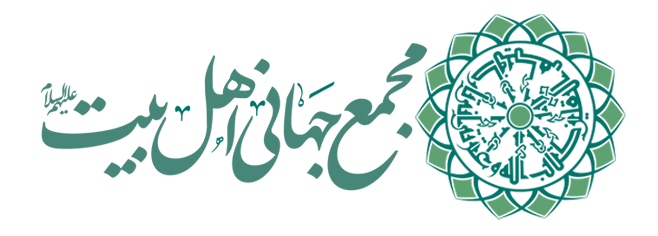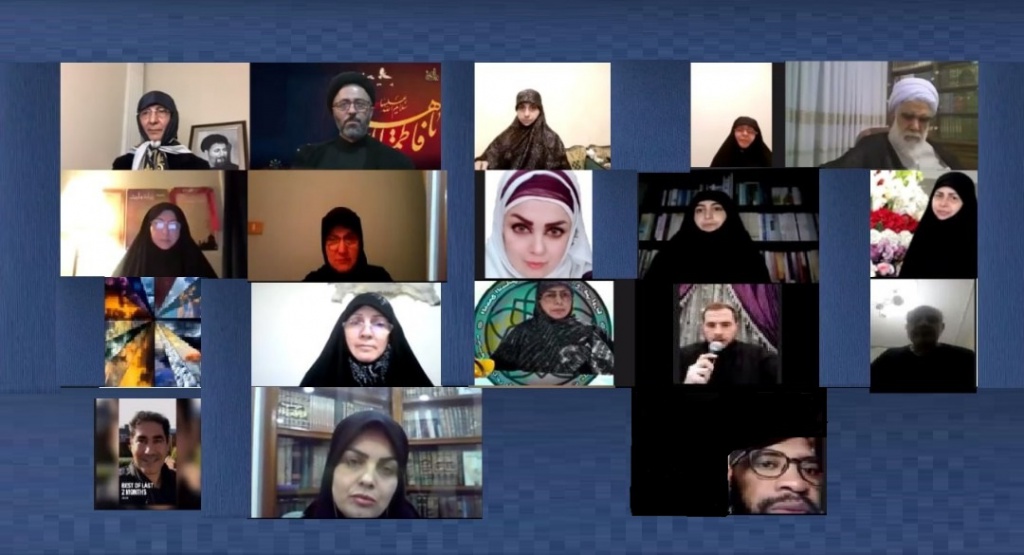To defend the oppressed, legal, and social organizations should follow the example of Lady Fatimah (a.s.): Akhtari
The Ashura International Foundation, with the cooperation and participation of the United Ummah Institute, held a virtual seminar on the occasion of the martyrdom of Lady Fatima Zahra (AS) entitled "Life of Lady Fatima and confrontation with the oppressors."
The Ashura International Foundation, with the cooperation and participation of the United Ummah Institute, held a virtual seminar on the occasion of the martyrdom of Lady Fatima Zahra (a.s.) entitled “Life of Lady Fatima and confrontation with the oppressors”.
The Ashura International Foundation, with the cooperation and participation of the United Ummah Institute, held a virtual seminar on the occasion of the martyrdom of Lady Fatima Zahra (a.s.) entitled “Life of Lady Fatima and confrontation with the oppressors”.
In this virtual seminar, a number of thinkers and elites from Arab and Islamic countries, and at the head of them, Ayatollah Mohammad Hassan Akhtari, head of the Ashura International Foundation and Hojat al-Islam Sayed Fadi Al-Sayed, head of the United Ummah Center, delivered their speeches.
In the opening speech of the webinar, while emphasizing the spiritual role of Lady Zahra (a.s.) in different stages of her blessed and short life, the head of the Ashura International Foundation spoke on the topic of the conference and considered it necessary to follow the example of the great lady of Islam.
In his speech Ayatollah Akhtar said, “In the life of Islamic societies, studying the life of the mother of Imams (a.s.) – Lady Fatimah (a.s.) – can be necessary and decisive for women and men, especially for the oppressed and the nations of the Resistance Axis.”
He also called on international organizations to prevent oppression, injustice, aggression, and discrimination, especially in the current political, economic and health crises.
Akhtari called on legal and social organizations to avoid double standards and discrimination, pressure, and restrictions against veiled women in the West. Because these policies are against freedom, human rights, international laws, and the charter of individual and social rights. He also called on these organizations to follow the example of Lady Fatimah Zahra (a.s.) in defending the oppressed and preventing the continuation of oppressive policies, injustice, and humiliation of oppressed nations.
In this webinar, while welcoming the guests and speakers, on the valuable spiritual and intellectual dimensions of the webinar topic, Sayed Fadi Al-Sayed, the head of the United Ummah Studies Institute, emphasized, “The intellectual and practical tradition of Lady Zahra (a.s.) is in accordance with the divine values, and can be followed in all periods of history and in all regions of the world.”
“The West, while oppressing others, tries to make up its face with deceptive slogans and giving a prosperous life to its people. But in the East, oppressive rulers oppress their people and collude with their enemies. This policy is seen in the multibillion-dollar ransom and bribes to the West, from the right of the people who live in poverty and deprivation,” he said, regarding the types of oppression in the East and the West.
“To get rid of this oppression, world people must follow the tradition of Lady Fatimah Zahra (a.s.). Because the tradition of Imam Ali (a.s.), Lady Fatimah (a.s.) and the Infallible Imams (a.s.), shows the way of defending the oppressed of the world, especially in Palestine, Yemen, Iraq, Syria, and Lebanon, and the oppressed minorities and the sanctities,” further emphasized Sayyid Fadi al-Sayed.
“On the one hand, the West supports the establishment of vulgar and immoral celebrations in Islamic and Arab countries, and on the other hand, it considers the celebration of the birth of the Prophet (p.b.u.h) as heresy, and, by puppet regimes, prevents the followers of AhlulBayt (a.s.) from holding ceremonies on religious occasions,” he emphasized.
In her speech, Ms. Robabeh Sadr, the head of the Imam Musa Sadr Institute, gave examples of the behavior and manners of this great lady of Islam and called for benefiting from the lifestyle of the beloved daughter of the Prophet in various cultural, social, scientific, and family dimensions. Because her school has trained great religious and divine leaders and presented them to the society, and the children of Lady Zahra (a.s.) became world leaders with their Quranic training.
Ms. Sadr stressed the need to increase efforts to eliminate oppression on human societies. “Lady Zahra (a.s.) has a great thought and thinking and her school is a savior for the world, and it can be applied at any time and place,” she said.
Lebanese lawyer and journalist Dr. Sondos al-Assad emphasized, “Lady Fatimah Zahra (a.s.) is the continuation of the line of revelation, and she is the martyr in the way of defending the right and Velayat.”
Presenting an analysis of the history of women in previous periods and comparing it with the status of women in Islam and Lady Fatimah (a.s.) as a clear example of Muslim woman, she said, “In the history of humanity, it has never been seen a religion like Islam that has given dignity to women. The Islam has come for the liberation of women from oppression in order to train man divinely.”
“Lady Zahra (a.s.) always defended the mission of Islam, revelation and the Velayat of the Imam of her time,” continued the legal activist.
Regarding the role of the Fatimid school in society and the upbringing of the family and children and emphasizing the concept and role of women as mothers, Dr. Nasrin Farzad, a professor at the University of Tehran, said, “By educating her children based on the school of Islam, Islamic revelation and values, Lady Zahra (a.s.) presented prominent leaders and imams to the society.”
At the meeting, Dr. Amal al-Assadi, a professor at Baghdad University, spoke about the meaning, concept, and history of the term “gender discrimination” in historical periods and its meaning in pre-Islamic religions and Jahiliyyah era. She also argued about Islam’s fight against misogyny based on the teachings of the Prophet Muhammad (p.b.u.h) and the sermons of Lady Zahra (a.s.) and provided examples of her role in combating gender discrimination, and the expression of women’s rights in Islam, along with the sayings of Imam Ali (a.s.).
At the end of his speech, in response to the question “How can Lady Zahra (a.s.) can be satisfied from us?” said, “We must prove our loyalty by fighting any oppression and discrimination against the oppressed and women in the world.”
In the webinar, Dr. Lina Wehbe from France spoke about the concept of love in the Fatimid school. She offered an interpretation of the literal and figurative meaning of love, and the relationship between sincere worshiping God and the conditions of divine love from the point of view of Lady Fatimah (a.s.), which was manifested in her character, who was the spirit of prophecy, Imamate, Islam, and belief.
In her speech, Dr. Hoveida Jabaq, President of the European Assembly of Women Followers of the AhlulBayt (a.s.), examined the personality and divine life and struggles of Lady Zahra (a.s.) during the life of her father, the Prophet Muhammad (p.b.u.h) and Imam Ali (a.s.). and emphasized, “Her role and spiritual assistance in the spread of Islam, her patience and endurance in the face of hardships after the demise of his beloved father is very instructive.”
“This symbol of patience and resistance against the oppressors and usurpers of his father’s inheritance, proved that her goal was to defend the principles of Islam and violated rights and to defend the sanctity of the Velayat of Imam Ali (a.s.),” Dr. Hoveida added, “We must promote the school of Ashura and martyrdom by educating our children.”
As another speaker of this webinar, Ms. Giovanna LeBaroli, a member of the Association of Women Followers of the AhlulBayt (a.s.) in Italy, on her devotion and love for the holy lady of Islam, Lady Zahra (a.s.) said, “This great and holy lady is still present in our time because she is infallible and by the will of God her nature is mixed with faith.”
“The danger that threatens and destroys the world and humanity is not hunger, war or virus, but selfishness and indifference,” said the Italian Muslim woman.
Regarding the way of educating a civilized and committed human being by following the example of the lifestyle of Lady Zahra (a.s.), Ms. Kafah Haddad, a writer and researcher from Iraq, emphasized, “History is a humanizing school if we follow its true patterns, namely the prophets and the AhlulBayt (a.s.), including Lady Fatimah (a.s.).”
In the end, she called for compiling a plan to follow the example of this great lady of history, in order to increase awareness and counter the cultural invasion of the West.
The Ashura International Foundation, with the cooperation and participation of the United Ummah Institute, held a virtual seminar on the occasion of the martyrdom of Lady Fatima Zahra (AS) entitled "Life of Lady Fatima and confrontation with the oppressors."
The Ashura International Foundation, with the cooperation and participation of the United Ummah Institute, held a virtual seminar on the occasion of the martyrdom of Lady Fatima Zahra (a.s.) entitled “Life of Lady Fatima and confrontation with the oppressors”.
The Ashura International Foundation, with the cooperation and participation of the United Ummah Institute, held a virtual seminar on the occasion of the martyrdom of Lady Fatima Zahra (a.s.) entitled “Life of Lady Fatima and confrontation with the oppressors”.
In this virtual seminar, a number of thinkers and elites from Arab and Islamic countries, and at the head of them, Ayatollah Mohammad Hassan Akhtari, head of the Ashura International Foundation and Hojat al-Islam Sayed Fadi Al-Sayed, head of the United Ummah Center, delivered their speeches.
In the opening speech of the webinar, while emphasizing the spiritual role of Lady Zahra (a.s.) in different stages of her blessed and short life, the head of the Ashura International Foundation spoke on the topic of the conference and considered it necessary to follow the example of the great lady of Islam.
In his speech Ayatollah Akhtar said, “In the life of Islamic societies, studying the life of the mother of Imams (a.s.) – Lady Fatimah (a.s.) – can be necessary and decisive for women and men, especially for the oppressed and the nations of the Resistance Axis.”
He also called on international organizations to prevent oppression, injustice, aggression, and discrimination, especially in the current political, economic and health crises.
Akhtari called on legal and social organizations to avoid double standards and discrimination, pressure, and restrictions against veiled women in the West. Because these policies are against freedom, human rights, international laws, and the charter of individual and social rights. He also called on these organizations to follow the example of Lady Fatimah Zahra (a.s.) in defending the oppressed and preventing the continuation of oppressive policies, injustice, and humiliation of oppressed nations.
In this webinar, while welcoming the guests and speakers, on the valuable spiritual and intellectual dimensions of the webinar topic, Sayed Fadi Al-Sayed, the head of the United Ummah Studies Institute, emphasized, “The intellectual and practical tradition of Lady Zahra (a.s.) is in accordance with the divine values, and can be followed in all periods of history and in all regions of the world.”
“The West, while oppressing others, tries to make up its face with deceptive slogans and giving a prosperous life to its people. But in the East, oppressive rulers oppress their people and collude with their enemies. This policy is seen in the multibillion-dollar ransom and bribes to the West, from the right of the people who live in poverty and deprivation,” he said, regarding the types of oppression in the East and the West.
“To get rid of this oppression, world people must follow the tradition of Lady Fatimah Zahra (a.s.). Because the tradition of Imam Ali (a.s.), Lady Fatimah (a.s.) and the Infallible Imams (a.s.), shows the way of defending the oppressed of the world, especially in Palestine, Yemen, Iraq, Syria, and Lebanon, and the oppressed minorities and the sanctities,” further emphasized Sayyid Fadi al-Sayed.
“On the one hand, the West supports the establishment of vulgar and immoral celebrations in Islamic and Arab countries, and on the other hand, it considers the celebration of the birth of the Prophet (p.b.u.h) as heresy, and, by puppet regimes, prevents the followers of AhlulBayt (a.s.) from holding ceremonies on religious occasions,” he emphasized.
In her speech, Ms. Robabeh Sadr, the head of the Imam Musa Sadr Institute, gave examples of the behavior and manners of this great lady of Islam and called for benefiting from the lifestyle of the beloved daughter of the Prophet in various cultural, social, scientific, and family dimensions. Because her school has trained great religious and divine leaders and presented them to the society, and the children of Lady Zahra (a.s.) became world leaders with their Quranic training.
Ms. Sadr stressed the need to increase efforts to eliminate oppression on human societies. “Lady Zahra (a.s.) has a great thought and thinking and her school is a savior for the world, and it can be applied at any time and place,” she said.
Lebanese lawyer and journalist Dr. Sondos al-Assad emphasized, “Lady Fatimah Zahra (a.s.) is the continuation of the line of revelation, and she is the martyr in the way of defending the right and Velayat.”
Presenting an analysis of the history of women in previous periods and comparing it with the status of women in Islam and Lady Fatimah (a.s.) as a clear example of Muslim woman, she said, “In the history of humanity, it has never been seen a religion like Islam that has given dignity to women. The Islam has come for the liberation of women from oppression in order to train man divinely.”
“Lady Zahra (a.s.) always defended the mission of Islam, revelation and the Velayat of the Imam of her time,” continued the legal activist.
Regarding the role of the Fatimid school in society and the upbringing of the family and children and emphasizing the concept and role of women as mothers, Dr. Nasrin Farzad, a professor at the University of Tehran, said, “By educating her children based on the school of Islam, Islamic revelation and values, Lady Zahra (a.s.) presented prominent leaders and imams to the society.”
At the meeting, Dr. Amal al-Assadi, a professor at Baghdad University, spoke about the meaning, concept, and history of the term “gender discrimination” in historical periods and its meaning in pre-Islamic religions and Jahiliyyah era. She also argued about Islam’s fight against misogyny based on the teachings of the Prophet Muhammad (p.b.u.h) and the sermons of Lady Zahra (a.s.) and provided examples of her role in combating gender discrimination, and the expression of women’s rights in Islam, along with the sayings of Imam Ali (a.s.).
At the end of his speech, in response to the question “How can Lady Zahra (a.s.) can be satisfied from us?” said, “We must prove our loyalty by fighting any oppression and discrimination against the oppressed and women in the world.”
In the webinar, Dr. Lina Wehbe from France spoke about the concept of love in the Fatimid school. She offered an interpretation of the literal and figurative meaning of love, and the relationship between sincere worshiping God and the conditions of divine love from the point of view of Lady Fatimah (a.s.), which was manifested in her character, who was the spirit of prophecy, Imamate, Islam, and belief.
In her speech, Dr. Hoveida Jabaq, President of the European Assembly of Women Followers of the AhlulBayt (a.s.), examined the personality and divine life and struggles of Lady Zahra (a.s.) during the life of her father, the Prophet Muhammad (p.b.u.h) and Imam Ali (a.s.). and emphasized, “Her role and spiritual assistance in the spread of Islam, her patience and endurance in the face of hardships after the demise of his beloved father is very instructive.”
“This symbol of patience and resistance against the oppressors and usurpers of his father’s inheritance, proved that her goal was to defend the principles of Islam and violated rights and to defend the sanctity of the Velayat of Imam Ali (a.s.),” Dr. Hoveida added, “We must promote the school of Ashura and martyrdom by educating our children.”
As another speaker of this webinar, Ms. Giovanna LeBaroli, a member of the Association of Women Followers of the AhlulBayt (a.s.) in Italy, on her devotion and love for the holy lady of Islam, Lady Zahra (a.s.) said, “This great and holy lady is still present in our time because she is infallible and by the will of God her nature is mixed with faith.”
“The danger that threatens and destroys the world and humanity is not hunger, war or virus, but selfishness and indifference,” said the Italian Muslim woman.
Regarding the way of educating a civilized and committed human being by following the example of the lifestyle of Lady Zahra (a.s.), Ms. Kafah Haddad, a writer and researcher from Iraq, emphasized, “History is a humanizing school if we follow its true patterns, namely the prophets and the AhlulBayt (a.s.), including Lady Fatimah (a.s.).”
In the end, she called for compiling a plan to follow the example of this great lady of history, in order to increase awareness and counter the cultural invasion of the West.






